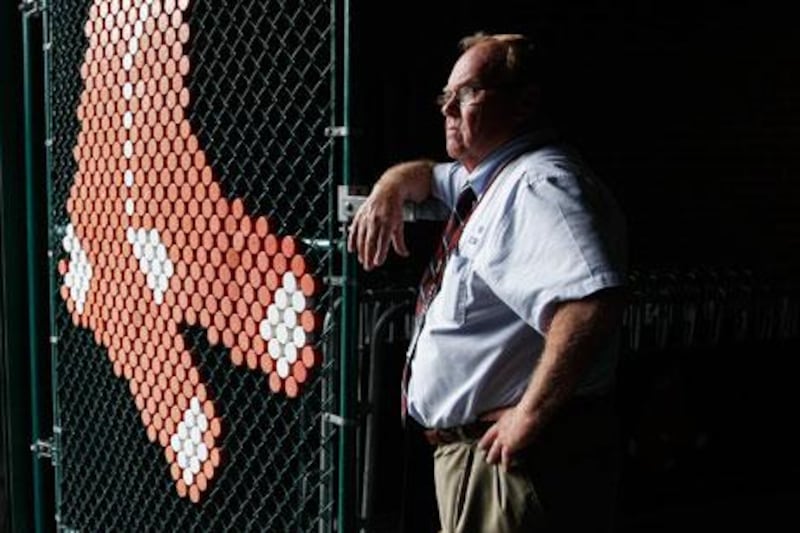The story arc of the 2011 Boston Red Sox suggests vivid words of clearly foreign origin, a trove which could enrich the lexicon of sports. And in this order: hubris, narcissism, nirvana, paranoia, deja vu, Armageddon, Schadenfreude.
For most of a century, the Red Sox were one of baseball's two great hard-luck franchises, along with the Chicago Cubs. The Red Sox, however, had the darker back story: in 1919 they indulged in flesh-peddling, selling (not trading) the immortal Babe Ruth to the New York Yankees for US$100,000 (Dh367,310).
That move shifted the balance of baseball power, and so severely to Boston's disadvantage that the deal was thought to have fomented what became known as The Curse of the Bambino, one of Ruth's many nicknames.
Before the sale, the Red Sox had won three championships in five seasons with Ruth; after, they did not win a World Series for 85 years, while the Yankees, never champions before the deal, won 26 World Series from 1923 to 2000.
Boston's drought ended in 2004 as they improbably overcame a 0-3 deficit in games to oust the Yankees in seven, and then won the World Series over the St Louis Cardinals. Much of the baseball world celebrated with them.
Soon, however, many generic baseball fans became disenchanted with the once accursed Red Sox.
Their fans, who had long since adopted the self-aggrandising appellation of "Red Sox Nation", had become insufferable in their self-absorption even as their organisation had turned into a crude cash machine outspent in US sports only by the Yankees.
After a second cash-stoked championship, in 2007, any claims the Red Sox once had of being scrappy but luckless underdogs were buried beneath enormous contracts given to great, as well as not-so-great, ballplayers.
Before the 2011 season, Boston committed $154m to Adrian Gonzalez and $142m to Carl Crawford, superior talents plucked from clubs with meagre resources, adding them to an already strong team. Red Sox Nation, smug in their pride, debated the course of the coming season. Would it be memorable? Or unparalleled?
A blogger for New England Sports Network, the regional sports television network, predicted that the 2011 Red Sox would be the greatest team in baseball history, eclipsing the 1927 New York Yankees, the gold standard of baseball, who won 110 games and lost 44.
After a difficult start, the Red Sox played in a way their Nation had expected, winning 80 games and losing 41 in the middle of baseball's long season, and after four months of such excellence their fans had to be counting down the days to another championship.
Then, it unravelled. A little losing streak begat a significant downturn begat a full-blown collapse.
What had been a seemingly insurmountable, nine-game Boston lead over the Tampa Bay Rays on September 2 shrivelled. If the Red Sox at first thought their struggles were due to jealous opponents playing harder against them, the depth of their implosion made clear that the problems began in their own clubhouse. Their pitching staff could not staunch a haemorrhage of runs; their hitters went cold; a "team" was unmasked as 25 individuals.
Red Sox Nation, remembering ancient failures too numerous to enumerate, recognised an old sensation - panic - as the Rays, a franchise with a $41m payroll, one-fourth that of the Red Sox, hunted them down.
On the final day of the 162-game season, well short of eclipsing the 1927 Yankees, the Red Sox found themselves tied with Tampa Bay at 90-71. For two hours, it seemed as if they might at least salvage a play-off berth; they led Baltimore 3-2 in the ninth inning and Tampa Bay trailed the Yankees 7-0 in the eighth.
Then the Rays scored six in the eighth and one in the ninth to tie, and the Red Sox ace reliever, Jonathan Papelbon, coughed up two runs in the bottom of the ninth in a 4-3 Baltimore victory.
When Tampa Bay defeated the Yankees on a home run three minutes later, the "greatest ever" Red Sox were out of the play-offs entirely and instead were owners of the "greatest ever" collapse in more than 130 years of baseball history.
While the Nation went into mourning, most baseball fans chortled with glee. An arrogant, self-important, big-spending team had been humbled, their obnoxious fans chastised for their outlandish expectations. It was a sort of national case of Schadenfreude, the German word for taking pleasure at another's misfortunes.
The Bambino would have approved, though someone would have had to tell him what "deja vu" and "hubris" meant.
[ poberjuerge@thenational.ae ]
Follow
The National Sport
on
[ @SprtNationalUAE ]
& Paul Oberjeurge on
[ @PaulOberjuerge ]





